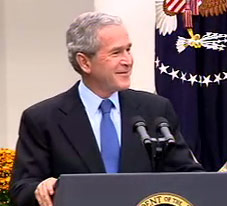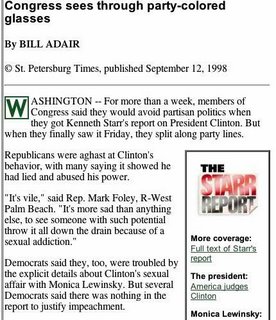
George W. Bush and Karl Rove have been playing evangelical Christians for suckers. So says the soon-to-be-released book "Tempting Faith," by David Kuo, former #2 man in Bush's so-called Office of Faith-Based Initiatives. Keith Olbermann, who previewed the book last night on MSNBC's "Countdown," calls it "a devastating work." Watch the video (http://www.crooksandliars.com/2006/10/11/olbermann-exclusive-dissecting-new-book-tempting-faith/) or read the transcript below. Olbermann will be talking about the book again on his show tonight at 10.
Keith Olbermann on "Countdown" (10/11/06):
When President Bush touched on Iraq at his news conference this morning, he may have been revealing more than he knew.
[video] BUSH: The stakes couldn't be any higher, as I said earlier, in the world in which we live. There are extreme elements that use religion to achieve objectives.
He was talking about religious extremists in Iraq. But an hour later, Mr. Bush posed with officials from the Southern Baptist Convention.
It is described as the largest, most influential evangelical denomination in a new book by the former number-two man in Bush's Office of Faith-Based Initiatives.
The book, "Tempting Faith," not out until Monday, but in our third story tonight, a Countdown exclusive, we've obtained a copy and it is a devastating work.
Author David Kuo's conservative Christian credentials are impeccable; his resume sprinkled with names like Bennett and Ashcroft. Now, as the Foley cover-up has many evangelical Christians wondering whether the G.O.P. is really in sync with their values, "Tempting Faith" provides the answer: No way.
Kuo, citing one example after another of a White House that repeatedly uses evangelical Christians for their votes - while consistently giving them nothing in return;
A White House which routinely speaks of the nation's most famous evangelical leaders behind their backs, with contempt and derision.
Furthermore, Faith-Based Initiatives were not only stiffed on one public promise after another by Mr. Bush - the office itself was eventually forced to answer a higher calling: Electing Republican politicians.
Kuo's bottom line: the Bush White House is playing millions of American Christians for suckers.
According to Kuo, Karl Rove's office referred to evangelical leaders as "the nuts."
Kuo says, "National Christian leaders received hugs and smiles in person and then were dismissed behind their backs and described as 'ridiculous,' 'out of control,' and just plain 'goofy.'"
So how does the Bush White House keep "the nuts" turning out at the polls?
One way, regular conference calls with groups led by Pat Robertson, James Dobson, Ted Haggard, and radio hosts like Michael Reagan.
Kuo says, "Participants were asked to talk to their people about whatever issue was pending. Advice was solicited [but] that advice rarely went much further than the conference call. [T]he true purpose of these calls was to keep prominent social conservatives and their groups or audiences happy."
They do get some things from the Bush White House, like the National Day of Prayer, “another one of the eye-rolling Christian events,” Kuo says.
And “passes to be in the crowd greeting the president when he arrived on Air Force One or tickets for a speech he was giving in their hometown. Little trinkets like cufflinks or pens or pads of paper were passed out like business cards. Christian leaders could give them to their congregations or donors or friends to show just how influential they were. Making politically active Christians personally happy meant having to worry far less about the Christian political agenda.”
When cufflinks weren't enough, the White House played the Jesus card, reminding Christian leaders that, quote, “they knew the president's faith” and begging for patience.
And the Office of Faith-Based Initiatives?
According to Kuo, “White House staff didn't want to have anything to do with the Faith-Based Initiative because they didn't understand it any more than did congressional Republicans . They didn't lie awake at night trying to kill it. They simply didn 't care."
Kuo relates one faith-based promise after another - billions of dollars in funding and tax credits - that goes unfulfilled year after promise after year.
He recounts one specific funding exchange with Mr. Bush:
Bush: "Eight billion in new dollars?"
Kuo: "No, sir. Eight billion in existing dollars for which groups will find it technically easier to apply. But faith-based groups have been getting that money for years."
Bush: "Eight billion. That's what we'll tell them. Eight billion in new funds for faith-based groups."
Why bother lying?
Kuo says, "The faith-based initiative had the potential to successfully evangelize more voters than any other."
According to Kuo, the Office spent much of its time on two missions:
One: Trying - and failing - to prove Mr. Bush's claim of regulatory bias against religious charities hiring who they wanted. Quote: "Finding these examples became a huge priority. …[but] religious groups had encountered very few instances of actual problems with their hiring practices. It really wasn't that bad at all."
Another mission: lobbying the President to make good on his own promises.
How?
Kuo says they tried to prove their political value by turning the once-bipartisan faith-based initiatives into a political operation.
It wasn't just discrimination against non-Christian charities. (One official who rated grant applications told Kuo, " when I saw one of those non-Christian groups in the set I was reviewing, I just stopped looking at them and gave them a zero…a lot of us did. ")
The Office was also, literally, a taxpayer-funded part of the Republican campaign machinery.
In 2002, Kuo says the office decided to "hold roundtable events for threatened incumbents with faith and community leaders … using the aura of our White House power to get a diverse group of faith and community leaders to a 'nonpartisan' event discussing how best to help poor people in their area."
White House Political Affairs director Ken Mehlman "loved the idea and gave us our marching orders. There were twenty targets." Including Saxby Chambliss in Georgia and John Shimkus in Illinois.
Mehlman devised a cover-up for the operation. He told Kuo, "It can't come from the campaigns. That would make it look too political. It needs to come from the congressional offices. We'll take care of that by having our guys call the office to request the visit."
Kuo explains, "this approach inoculated us against accusations that we were using religion and religious leaders to promote specific candidates."
Those roundtables were a hit. Republicans won 19 of those 20 races. 76 percent of religious conservatives voted for Chambliss over decorated war hero Max Cleland.
And Bush's 2004 victory in Ohio? That "was at least partially tied to the conferences [they] had launched [there] two years before."
By that time, Kuo had left the White House, concluding that "it was mocking the millions of faithful Christians who had put their trust and hope in the President and his administration. Bush knew his so-called compassion agenda was languishing and had no problem with that."
If you would question Mr. Kuo's credibility, you should know his former boss also quit the White House complaining in his one public interview that politics drove absolutely everything in the Bush administration. There is more, much more revealed in Tempting Faith… how Jack Kemp was tricked into sounding like a religious conservative without even knowing it; Jerry Falwell's astonishing behavior at the 9/11 Day of Remembrance and considerably more as our Countdown exclusive of Tempting Faith continues here tomorrow night.
http://www.crooksandliars.com/2006/10/11/olbermann-exclusive-dissecting-new-book-tempting-faith/










